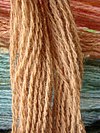Reactive dye printing
Reactive dye printing is a method of printing by Reactive dyes paste or wax by using mixture of Sodium alginate Gum, Soda ash, Urea and kerosin thereof to create a paste of colors. after printing of fabrics by this reactive dyes Printing paste, the printed fabrics must be needed heat setting for drying at 130 degree temperature and curing at 180 degree Temperature. by this heating the Reactive printing paste will be permanently fixed on fabrics. after that the fabrics will need finish with softener for better hand feel.
With a and a heat-activated printing additive, images can be permanently bonded to the substrate (typically textiles, but can include cellulose, fibers, polyester, and even proteins). These reactions are generally heat-activated.
External links
[edit]

